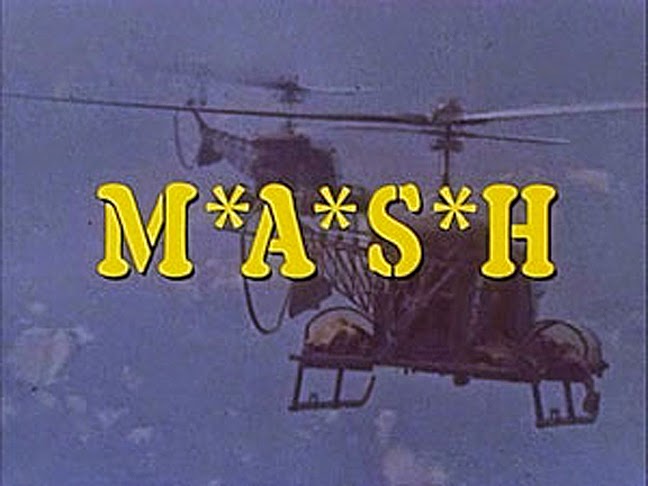While it's not anime, M*A*S*H is something near and dear to my heart so I wanted to talk about it real quick. It's not a huge post and I'll have one up about Madoka in just a bit. But for now, here's something from a 1970s-80s sitcom drama.
Radar walks into the makeshift military operating room already in agony, but trying to hold a steady voice. Around him, everyone is working, attempting to sew up the mountain of casualties that come in one after another onto the operating table. Radar, too unstable to stand, leans on the closest thing to him and announces through tears to the doctors, nurses,and staff in the room, “I have a message… Lieutenant Colonel Henry Blake’s plane… was shot down over the Sea of Japan. It spun in... There were no survivors.” Radar walks out and leaves the operating room. The only sound among the friends of Henry Blake, the closest family he had, is the clink of instruments working through injured bodies of more military casualties. Somewhere off-screen, one instrument falls to the floor and clatters in the almost silence as everyone continues to work. There’s no stopping to mourn for their closest friend while the war rages on. They can only continue to work through their tears.
The above scene is one of my favorites from across all television. M*A*S*H is a highly celebrated sitcom that ran from the 70s into the early 80s about a Mobile Army Surgical Hospital in South Korea during the Korean war. What started as a comedy about doctors finding humor in their tours of Korea, took on a much more serious tone over the course of its long eleven season series and showed how these characters used comedy to keep morale up and bite back tears over the horrors of war. The scene in question comes from the season three finale of the show titled “Abyssinia, Henry” which was written to mark the departure of McClean Stevenson, who played Henry Blake, from the show. When this episode initially ran, viewers were outraged and even the studio was dissatisfied with the direction the show took. And for good reason. Many people at the time thought of M*A*S*H as just a comedy with a dark setting, even though death was a common theme throughout the first few seasons. (In fact, the theme song for the show is called “Suicide is Painless”) But most importantly of all, it marked one of the very few times a main character had been killed off in a show since television’s inception.
While nowadays, people keep kill counts by the episode on popular shows like The Walking Dead and Game of Thrones, back then, most people thought of television as primarily light-hearted entertainment. There was rarely ever a show that killed off its characters, particularly main characters. Instead, most roles were simply written out of the show if an actor left, with characters leaving on a long vacation or going to travel the world. This can even be seen with Doctor Who, whose ingenious idea of a difference in their main character was to say that The Doctor “regenerated” every now and then, instead of trying to write a new Doctor into the show. However, the writers and director of M*A*S*H wanted to do something extraordinary by making the last goodbye of Henry Blake forever memorable as well as make a statement to the public about how terrible war is. This latter reason was a huge deal as during the time M*A*S*H was on the air, the Vietnam War was in full effect. The producer confirmed this during the documentary Making M*A*S*H, stating:
“…if we turned on the [television] set we would see fifteen people [killed in Vietnam every night]. They don't complain about that because it is unfelt violence, it is unfelt trauma. And that's not good. I think that if there is such a thing as the loss of life there should be some connection, and we did make a connection. It was a surprise, it was somebody they loved. They didn't expect it, but it made the point. People like Henry Blake are lost in war.”
And while people were taken aback at first, it was this ending that later turned into inspiration for many shows to come. It’s thanks to this risky move and hundreds more that followed from the later episodes of M*A*S*H that many shows decided to also break the mold and incorporate darker and more mature elements, such as death, heavily into their shows.
M*A*S*H after this point became a much more serious show, but never lost its comedic humor. Some episodes were devoted to nothing but camp antics and pranks, while others showed us war literally through the eyes of a soldier or the psychological problems of dealing with death on a daily basis and what can finally break you. The show would later go on to win numerous awards and its series finale in 1983 became the most watched television broadcast in American history until it was finally beaten almost three decades later in 2010 by Super Bowl XLIV. It even beat out the Super Bowl in 1983 for the most expensive commercial breaks of any broadcast that year. It's a wonderful show and many shows nowadays owe a lot to what M*A*S*H did so well: drama, comedy, and a perfect blend of the two.
Research for this topic:
"Making M*A*S*H." MASH4077TV.com. N.p., 2 Jan. 2005. Web. 19 Sept. 2014. <http://www.mash4077tv.com/articles/makingmash/>.
"Script Doctors." Snopes.com: M*A*S*H: Col. Henry Blake's Death. N.p., 21 Mar. 2009. Web. 19 Sept. 2014. <http://www.snopes.com/radiotv/tv/mash.asp>.
Gardner, Tim. "Saints' Win over Colts in Super Bowl XLIV Is Most-watched Television Program Ever." USA Today. Gannett, 08 Feb. 2010. Web. 19 Sept. 2014. <http://content.usatoday.com/communities/thehuddle/post/2010/02/saints-win-in-super-bowl-xliv-scores-highest-tv-ratings-since-1987/1#.VBvFjvmJ_A8>.
Wittebols, James H. Watching M*A*S*H, Watching America: A Social History of the 1972-1983 Television Series. Jefferson, NC: McFarland, 1998. Print.
Diffrient, David Scott. M*A*S*H. Detroit: Wayne State UP, 2008. Print.
For the Lazy:


No comments:
Post a Comment